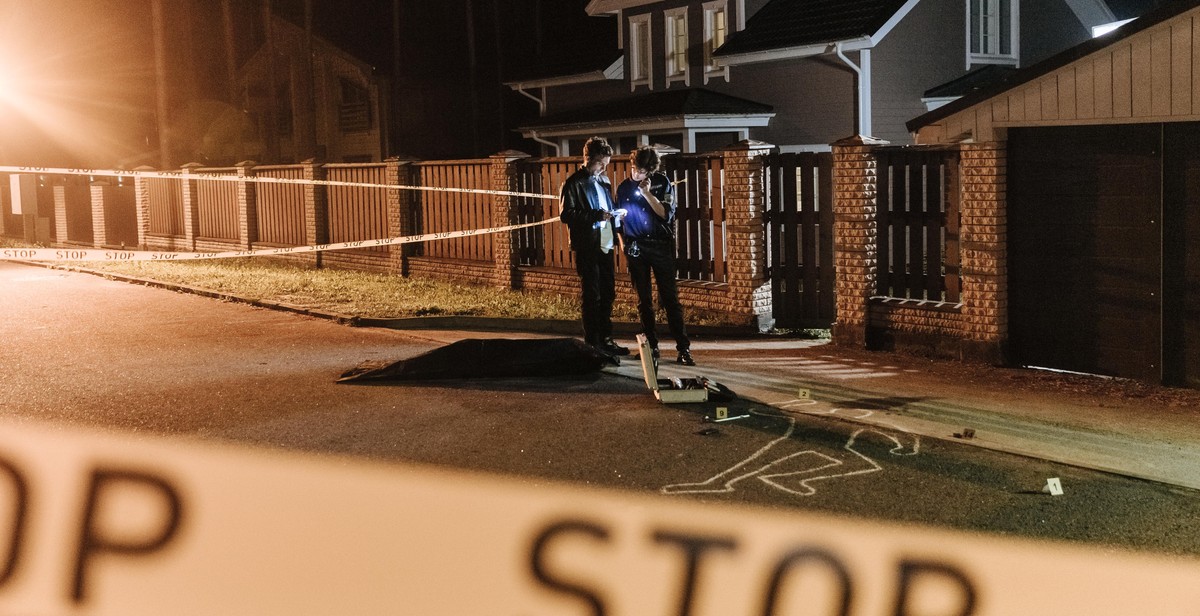How to Become a Crime Scene Investigator: Education and Training Path for Forensic Investigators
Have you ever watched a crime show and wondered how the forensic investigators collect and analyze evidence to solve the case? If you have a passion for justice and a keen eye for detail, becoming a crime scene investigator (CSI) may be the perfect career for you.
What is a Crime Scene Investigator?
A crime scene investigator is a trained professional who collects, documents, and analyzes physical evidence from crime scenes. They work closely with law enforcement to help solve crimes by piecing together evidence and presenting it in court.
Education and Training
To become a CSI, a minimum of a bachelor’s degree in forensic science or a related field is required. Some employers may also require a master’s degree or specialized training in areas such as DNA analysis or ballistics. In addition to formal education, on-the-job training is essential to gain practical experience in the field.
Other important skills for a CSI include attention to detail, critical thinking, and the ability to work well under pressure.
Job Outlook and Salary
The job outlook for crime scene investigators is positive, with a projected growth rate of 14% from 2019 to 2029. The median annual salary for CSIs is $60,590, with the highest 10% earning more than $97,200.
Overall, becoming a CSI requires a combination of education, training, and practical experience. If you have a passion for justice and a desire to make a difference in your community, this may be the perfect career for you.

What is a Crime Scene Investigator?
A crime scene investigator (CSI) is a professional who collects, analyzes, and processes physical evidence found at crime scenes. The primary goal of a CSI is to provide accurate and reliable evidence that can be used in court to solve crimes. The job of a CSI is a critical part of the criminal justice system, and it requires a high level of skill, attention to detail, and scientific knowledge.
Roles and Responsibilities of a Crime Scene Investigator
The roles and responsibilities of a CSI can vary depending on the specific job and jurisdiction. However, some of the typical responsibilities of a CSI may include:
- Documenting the crime scene by taking photographs, sketches, and notes
- Collecting and preserving physical evidence, such as blood, hair, and fibers
- Processing evidence in a laboratory setting, including DNA testing and fingerprint analysis
- Collaborating with other professionals, including law enforcement officials, forensic scientists, and attorneys
- Testifying in court and presenting evidence to a judge or jury
Skills Required for a Career as a Crime Scene Investigator
To become a successful CSI, you will need a wide range of skills and knowledge. Some of the essential skills for a CSI include:
- Attention to detail and the ability to identify and analyze evidence accurately
- Strong communication skills to work with other professionals and present evidence in court
- Scientific knowledge, including an understanding of biology, chemistry, and physics
- Problem-solving skills and the ability to think critically under pressure
- Physical fitness and the ability to work long hours in challenging environments
Conclusion
Overall, a career as a crime scene investigator can be rewarding and challenging. If you are interested in pursuing a career as a CSI, you will need to obtain the right education, training, and experience. With the right skills and qualifications, you can become a vital part of the criminal justice system and help solve crimes in your community.

Education Requirements for Crime Scene Investigators
Crime scene investigators are responsible for collecting, preserving, and analyzing evidence found at crime scenes. The job requires a strong foundation in science and law enforcement, which is why a bachelor’s degree is required for most positions.
Bachelor’s Degree in Forensic Science
A bachelor’s degree in forensic science is the most direct path to becoming a crime scene investigator. This degree program provides students with a comprehensive understanding of forensic science, including crime scene investigation, evidence collection, and analysis. Students will also gain a strong foundation in chemistry, biology, and physics, which are essential for analyzing evidence.
Some of the courses that students will take in a forensic science program include:
- Forensic biology
- Forensic chemistry
- Forensic toxicology
- Crime scene investigation
- Evidence collection and analysis
Bachelor’s Degree in Natural Science or Criminal Justice
While a bachelor’s degree in forensic science is the most direct path to becoming a crime scene investigator, it is not the only path. Some crime scene investigators have a bachelor’s degree in natural science or criminal justice. These degree programs provide students with a strong foundation in their respective fields, which can be applied to crime scene investigation.
Some of the courses that students will take in a natural science or criminal justice program include:
- Biology
- Chemistry
- Physics
- Criminal law
- Criminal investigation
| Degree Program | Strengths | Weaknesses |
|---|---|---|
| Bachelor’s Degree in Forensic Science | Directly applicable to crime scene investigation | May be too narrow in focus |
| Bachelor’s Degree in Natural Science or Criminal Justice | Provides a strong foundation in science or law enforcement | May require additional training in forensic science |
Regardless of the degree program, crime scene investigators must also complete on-the-job training and continuing education to stay up-to-date with the latest techniques and technologies in forensic science.

Training Programs for Crime Scene Investigators
Crime scene investigators must undergo extensive training to gain the skills and knowledge required to investigate and analyze crime scenes. The following are the most common training programs for crime scene investigators:
Police Academy Training
Police academy training is the initial training program that aspiring crime scene investigators must complete to become a police officer. This training program usually lasts for several months and covers a wide range of topics, including criminal law, self-defense, firearms training, and emergency response. Police academy training provides the foundation for a career in law enforcement and is essential for all crime scene investigators.
On-the-Job Training
On-the-job training is another important training program for crime scene investigators. This training program provides hands-on experience and allows new investigators to learn from experienced professionals. During on-the-job training, crime scene investigators learn how to collect and analyze evidence, document crime scenes, and work with other law enforcement agencies. On-the-job training can last for several months to several years, depending on the agency and the investigator’s experience level.
Forensic Science Training Programs
Forensic science training programs are specialized training programs that focus on the scientific techniques used to analyze and interpret evidence. These programs cover a wide range of topics, including DNA analysis, fingerprint analysis, ballistics, and toxicology. Forensic science training programs are essential for crime scene investigators who want to specialize in a particular area of forensic science. These programs can be completed online or in person and can last from a few weeks to several months.
| Training Program | Duration | Skills Taught |
|---|---|---|
| Police Academy Training | Several months | Criminal law, self-defense, firearms training, emergency response |
| On-the-Job Training | Several months to several years | Evidence collection and analysis, crime scene documentation, working with other law enforcement agencies |
| Forensic Science Training Programs | A few weeks to several months | DNA analysis, fingerprint analysis, ballistics, toxicology |
Overall, crime scene investigators must complete a combination of police academy training, on-the-job training, and forensic science training programs to gain the skills and knowledge required to investigate and analyze crime scenes. The duration and content of these training programs can vary depending on the agency and the investigator’s experience level.

Certifications for Crime Scene Investigators
Obtaining a certification in crime scene investigation is an excellent way to demonstrate your expertise and knowledge in the field. There are several organizations that offer certification programs for crime scene investigators.
International Association for Identification Certification
The International Association for Identification (IAI) offers several certification programs for crime scene investigators, including:
- Crime Scene Certification
- Latent Print Certification
- Forensic Photography Certification
- Bloodstain Pattern Analysis Certification
To be eligible for IAI certification, you must meet specific education and experience requirements. You must also pass a written exam and submit a practical exercise demonstrating your skills in the certification area.
American Board of Criminalistics Certification
The American Board of Criminalistics (ABC) offers certification programs for forensic scientists and crime scene investigators. The ABC offers certification in several areas, including:
- Drug Analysis
- Toxicology
- Fire Debris Analysis
- Trace Evidence Analysis
To be eligible for ABC certification, you must have a bachelor’s degree in a natural science, complete specific coursework, and have at least two years of experience in the certification area. You must also pass a written and practical exam.
National Forensic Science Technology Center Certification
The National Forensic Science Technology Center (NFSTC) offers certification programs for crime scene investigators and other forensic professionals. The NFSTC offers certification in several areas, including:
- Crime Scene Investigation
- Latent Print Analysis
- Forensic Biology
- Forensic Toxicology
To be eligible for NFSTC certification, you must meet specific education and experience requirements. You must also pass a written and practical exam.
| Certification Body | Certification Areas |
|---|---|
| International Association for Identification | Crime Scene, Latent Print, Forensic Photography, Bloodstain Pattern Analysis |
| American Board of Criminalistics | Drug Analysis, Toxicology, Fire Debris Analysis, Trace Evidence Analysis |
| National Forensic Science Technology Center | Crime Scene Investigation, Latent Print Analysis, Forensic Biology, Forensic Toxicology |
Obtaining a certification from one of these organizations can improve your job prospects and increase your earning potential as a crime scene investigator.

Conclusion
Becoming a crime scene investigator can be a challenging yet rewarding career path for those interested in forensic investigation. The education and training path for forensic investigators is rigorous and demands a high level of commitment and dedication.
As outlined in this article, the first step towards becoming a crime scene investigator is obtaining a degree in forensic science or a related field. This will provide a strong foundation in the principles and techniques of forensic investigation.
After completing a degree program, aspiring investigators should gain hands-on experience through internships or entry-level positions in law enforcement agencies or private forensic investigation firms. This will provide exposure to real-life crime scene investigations and the opportunity to work alongside experienced investigators.
Continuing education is also critical for career advancement in this field. Forensic investigators should regularly attend training sessions and workshops to stay up-to-date with the latest techniques and technologies in forensic investigation.
Overall, becoming a crime scene investigator requires a combination of education, training, and hands-on experience. By following the steps outlined in this article, individuals can pave the way towards a successful career in forensic investigation.
- Obtain a degree in forensic science or a related field
- Gain hands-on experience through internships or entry-level positions
- Attend training sessions and workshops to stay up-to-date with the latest techniques and technologies in forensic investigation
With dedication and hard work, individuals can become skilled crime scene investigators and contribute to the pursuit of justice in their communities.
